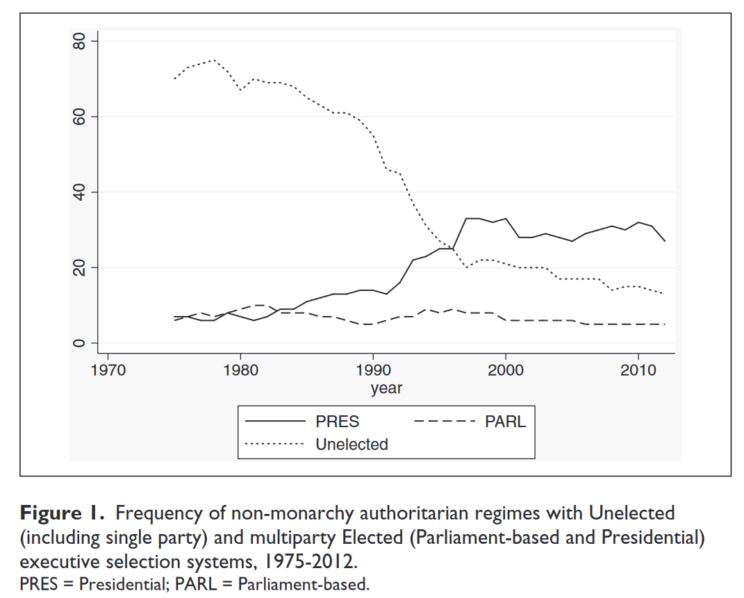Autocratic leaders love Presidential System – and Imran Khan is no exception. Pakistan has witnessed a consistent deterioration of democracy and fundamental rights quality during his nearly four years-long stint. He has touted Presidential System on many occasions while in power. Now that he has been ousted through a constitutional process by an active parliament, he has once again tried to discredit the Parliamentary System to preach a transition to a Presidential System. His logic? A Presidential System bars dishonest politicians from holding power. The reality? Such a system is potential autocrats’ personal favorite.
I will not go into technical details in this piece but describe why Presidential Systems, in general, are more prone to turning into full-blown autocracies than Parliamentary Systems due to one variable – Veto Players inherent in the system. I will also present data to show that there are more autocratic Presidential Systems than there are such Parliamentary Systems (with varying degrees of variation in both systems in practice). Finally, I will briefly describe the transition of the Republic of Turkey from a parliamentary to a presidential system that resulted in the swift deterioration of democracy followed by a severe economic downturn, and suggest that Imran Khan is trying to walk in Erdogan’s shoes. Pakistan had her own Presidential moments – most recently under Musharraf – that were not exactly desirable.
I will start with the Veto Players, who are the actors whose consent is required to change the status quo – and the status quo here is constitutional rules, procedural norms, and policies. Usually, these are formal institutions like the Parliament and the Judiciary but could be other informal actors like the Military, bureaucracy, or the interest groups. Any executive needs the consent of these players to implement radical steps. In that sense, the presence of multiple Veto Players compels the executive to engage in debates and convince others of the merits of their objectives. Executive, on the other hand, wants to implement their agenda with minimum opposition. We know from history – especially from the Nazi Germany example – that unopposed executives could wreak absolute havoc. The parliamentary and judicial reviews then act as emergency brakes to the otherwise unruly juggernaut of the executive. In short, the more veto players in the system, the optimum decisions are by virtue of rigorous deliberation and substantive consensus.
Imran Khan laments precisely this point: i.e., he wanted to implement radical ‘reforms,’ but the Parliament did not allow him to do so. His view not only represents his contempt for procedural politics but also hides something more insidious – his desire for an absolutist system where there are no speedbumps to moderate his whimsical politics. This is precisely the reason why autocrats prefer Presidential Systems. Data suggests that there are roughly three times more dictatorships running under Presidential System than those running under Parliamentary System. The following graph makes it abundantly clear that Presidential Systems are more amenable to autocratic rule than Parliamentary Systems.

The question then is, what’s unique about Presidential System? There are fewer checks and balances to start with, i.e., fewer players who would veto or slow down whimsical decisions. Autocrats generally want electoral legitimacy but no parliamentary oversight. They want a system where the executive is independent of the legislature, where the Parliament seldom scrutinizes their executive decisions, and where they do not have to appear to answer the bitter questions of the opposition. There are examples where such autocrats eventually design a system with minimum to no checks and balances of the legislature on executive decisions, where elections serve as mere legitimizing mechanisms, and where the Judiciary can be coerced into stamping their decisions. This is precisely what has happened in Turkey, which resulted in total chaos.
Like Imran Khan, Erdogan wanted swift decision-making powers, which is simply a euphemism for his desire to bypass the deliberative democratic process. It is important to point out that, unlike Imran Khan, Erdogan did deliver on both economic growth and democratization before he became paranoid when one of his key allies rebled against him. Amidst fear and chaos created by a failed coup attempt, Erdogan rushed a Presidentialism Alla Turca and installed himself as President in a system with minimum role of the Parliament in decision making. He had already coopted the Judiciary by purging oppositional elements. The new system allowed him to issue whimsical decrees arresting his foes – the traits – and run the country like Middle Ages Sultanate. This transition to Presidential System effectively led to the demise of a burgeoning economy and blossoming democracy – basically undoing any good he had done in the past.
It is abundantly clear that Imran Khan wants to be the next Erdogan (who, by the way, is a dictator that most Pakistanis think of as a saint). By extension, his desire for Presidential System is intertwined with his admiration of Erdogan’s whimsical politics. He has repeatedly praised the historical propaganda series – Dirilis Ertugrul – Erdogan used to promote his ‘Us vs. the Traitors within’ narrative where protagonists go on beheading traitors. His desires and trajectory are telltale signs of what is going on in his head, i.e., creating an autocratic state under a doctored Presidential System with make-believe electoral legitimacy.
What Pakistan needs now is neither a populist leader like Imran Khan, who has no regard for procedural and deliberative politics, nor a system that would get rid of any speedbumps in the path of whimsical political decisions. Pakistan instead needs a robust Parliamentary System with an independent judiciary and strong civil society to invigorate our still fledgling and fragile democracy. We do not need a government independent of the Parliament, but a government held accountable by the Parliament!
Also appeared in The Friday Times: https://www.thefridaytimes.com/2022/04/21/imran-khan-failed-before-he-could-win-the-strongmans-games/